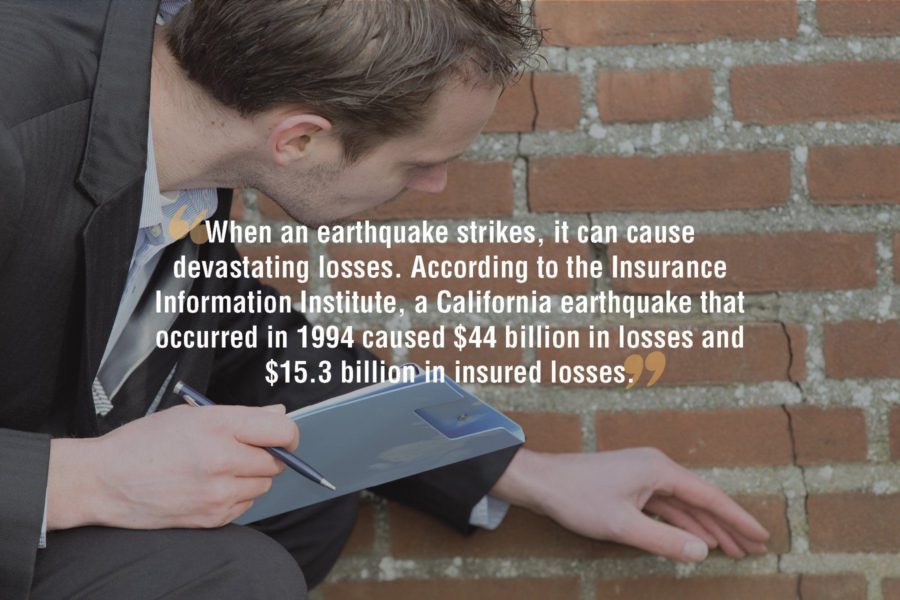If you have homeowners insurance to protect your house, you might think you have all the coverage you need. This isn’t always true. Homeowners insurance provides protection against many common risks, but some risks are typically excluded. You may already know that flood insurance has to be purchased separately. Likewise, earthquake coverage is typically excluded from home insurance policies, so coverage must be purchased separately.
For many homeowners, purchasing earthquake insurance is a smart investment. When deciding whether or not you should purchase coverage, there are a few things to consider.
How is homeowners insurance earthquake coverage provided?
Earthquake coverage is typically excluded from standard homeowners insurance policies. It is also typically excluded from standard condo and renter’s insurance policies. A fire that occurs following an earthquake may be covered, but the losses from the earthquake itself will not be covered.
To purchase earthquake coverage, you have two main options. One, you can purchase a standalone policy that is separate from your home insurance policy. Two, you can purchase an endorsement that adds earthquake coverage to your home insurance policy.
What does earthquake insurance cover?
When an earthquake strikes, it can cause devastating losses. According to the Insurance Information Institute, a California earthquake that occurred in 1994 caused $44 billion in losses and $15.3 billion in insured losses.
Earthquake insurance provides coverage for three types of expenses, up to the policy’s limits and according to the terms of the policy:
- Earthquake insurance can provide coverage for structural damage caused by an earthquake. Earthquakes can cause significant structural damage, including damage to the foundation. According to Home Advisor, foundation damage caused by an earthquake can easily cost $5,000 to $10,000 to repair, and homeowners without insurance may pay more than $30,000.
- Earthquake insurance can also provide coverage for personal property that is damaged or destroyed in an earthquake.
- Earthquake insurance also provides coverage for additional living expenses. After an earthquake, your home might not be safe to live in until repairs are made. This may be due to structural damage, or it may be a result of gas leaks and other threats caused by the earthquake. Additional living expenses coverage can pay for hotel stays and other related expenses until you can return to your home.
Where are earthquakes a threat?
How likely an earthquake is to occur will depend largely on where you live. Most people know that California experiences earthquakes frequently. According to the U.S. Department of the Interior, 81 percent of the world’s largest earthquakes occur along the circum-Pacific seismic belt, also known as the Ring of Fire. The Ring of Fire spans nearly 25,000 miles and covers the West Coast of the U.S., including parts of Alaska, Washington, Oregon and California. Hawaii is in the center of the Ring of Fire.
Earthquakes can be possible outside of high-activity areas. For example, the USGS cites earthquakes in New Madrid, MO, in 1811 and 1812 and an earthquake in Charleston, SC, in 1886. Also, the Wasatch Range that runs through Utah was produced by earthquakes and has had an earthquake with a magnitude of 6.5 or greater about every 350 years for the last 6,000. The last powerful earthquake occurred about 350 years ago.
Drilling activity may also trigger or strengthen earthquakes. As a result, areas that used to have minimal earthquake risk may now face a greater threat. According to National Geographic, research has shown that wastewater left from oil and natural gas production could result in higher-magnitude earthquakes in states like Oklahoma and Kansas. Scientific American says that earthquakes have skyrocketed in Oklahoma and Texas since 2008 and that the cause appears to wastewater from oil and gas drilling operations.
The Department of the Interior says that there are about 500,000 detectable earthquakes each year, but only 100,000 of these can be felt by humans and only about 100 cause damage. Southern California alone experiences about 10,000 earthquakes each year, but most of them are very minor, and only about 15 to 20 have a magnitude greater than 4.0.
Do you need earthquake insurance coverage?
As we’ve seen, some areas – like California – are prone to earthquake activity, making earthquake insurance a smart coverage option. If you live in an area with very high seismic activity, your mortgage provider may require earthquake insurance.
Other places have a lower risk. Although this means you that you are less likely to experience an earthquake-related loss, it also means that you’ll probably receive lower rates for earthquake coverage. Earthquakes can occur in low-frequency areas, so this might still be a sound investment.
When deciding if you should purchase earthquake insurance coverage, ask yourself the following questions:
- What is the earthquake risk in your area? You may need to do some research to determine how close you are to a fault line.
- How expensive is earthquake insurance? Don’t just assume coverage is too expensive. Cost effective earthquake insurance may be available, so shop around for the best rates.
- Could you afford repairs and living expenses without earthquake insurance? If not, purchasing coverage to cover any earthquake damage is likely a sound investment.
How much does earthquake insurance cost?
The premium cost for earthquake insurance can vary widely. If you live in an area with frequent earthquake activity, the rates will be much higher than if you live in an area with low earthquake activity.
In addition to the premium, you should consider the deductible. The deductible for earthquake coverage is usually based on a percentage of the policy’s limit, and it may be as high as 15 percent. If you experience a claim, you will need to pay this deductible out of pocket.
Which insurance carriers provide earthquake insurance?
Many private insurance companies provide earthquake insurance coverage. In California, coverage can be purchased through the California Earthquake Authority.
When comparing your earthquake coverage options from different insurance carriers, you should consider several key factors beyond the premium and possible discounts. Also look at the deductible that you will have to pay if you file a claim, as well as the details of the coverage and any exclusions that apply.
Your Higginbotham insurance broker can help you compare the options available and the best earthquake coverage for your situation. Contact us to learn more.





